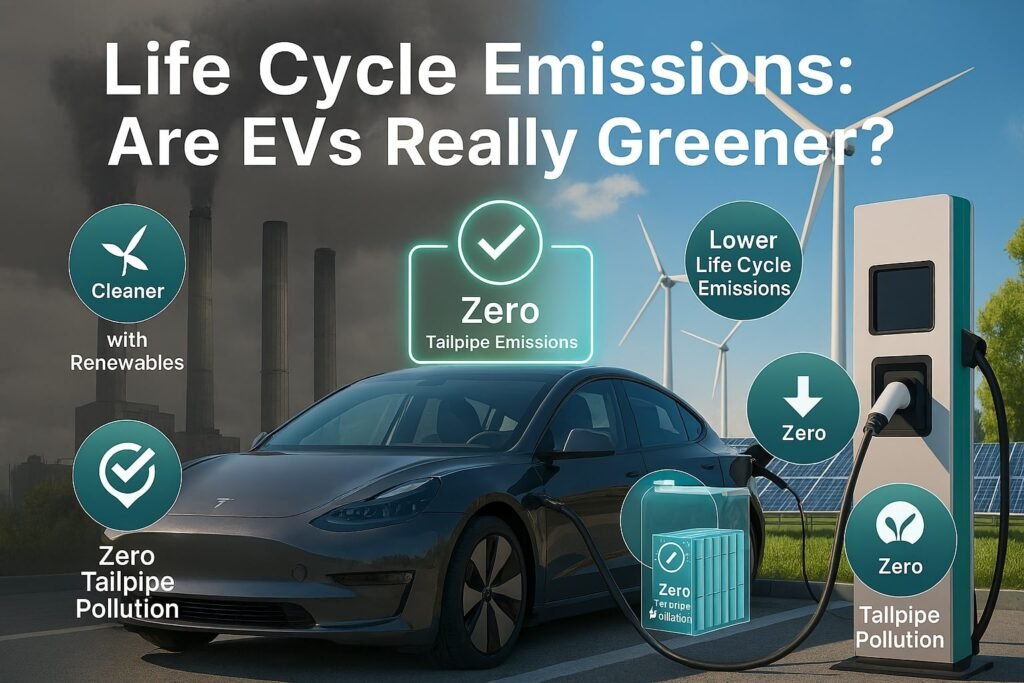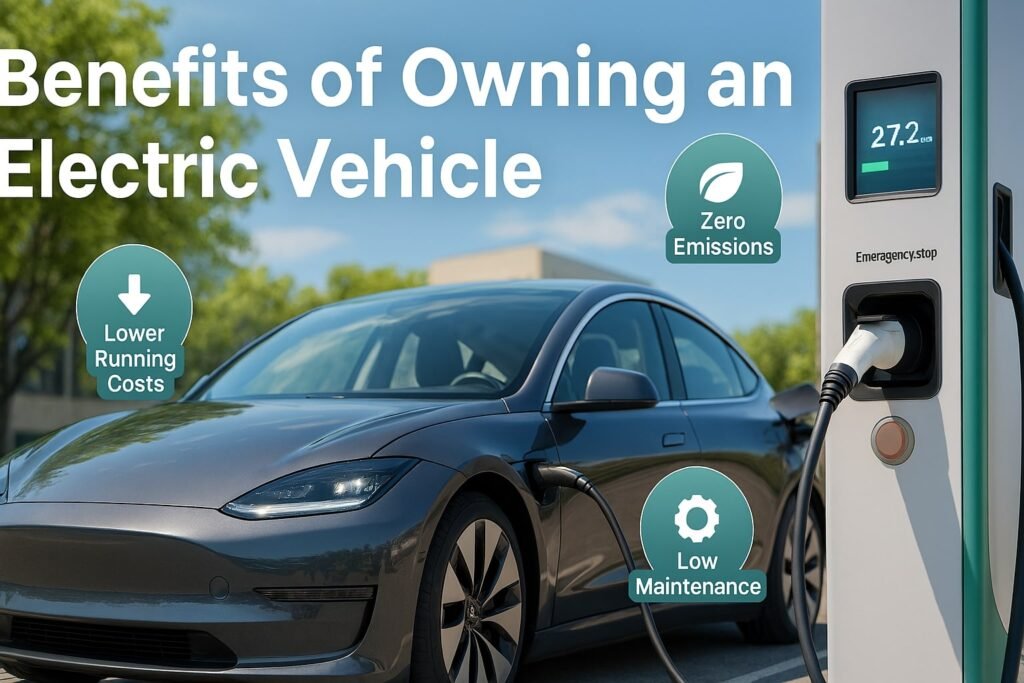If you’re wondering about the benefits of owning an electric vehicle, the short answer is simple: EVs save money on fuel, reduce emissions, and provide a smoother driving experience. But the real story is much bigger. From advanced battery technology to government tax credits, electric vehicles (EVs) are reshaping transportation in ways that go beyond just driving.
In this guide, we’ll explore the advantages of EV ownership, explain how life cycle emissions work, review fuel economy metrics, and show you how incentives and infrastructure are making EVs more practical than ever.
Why Consider the Benefits of Owning an Electric Vehicle?
Electric vehicles (EVs)—including battery electric vehicles (BEVs), plug-in hybrid electric vehicles (PHEVs), and hybrid electric vehicles (HEVs)—are designed to reduce dependency on fossil fuels.
The key benefits of owning an electric vehicle include:
- Lower fuel and maintenance costs.
- Reduced greenhouse gas emissions.
- Access to federal and state tax incentives.
- Flexible home and public charging infrastructure.
- Advanced battery technology with long warranties.
1. Battery Technology: The Core of EV Performance

Modern EVs rely on lithium-ion batteries engineered for long life and efficiency. Many automakers now offer 8-year/100,000-mile warranties, with research from the U.S. Department of Energy (DOE) and National Renewable Energy Laboratory suggesting real-world lifespans of 12–15 years in moderate climates.
EV batteries are built to last longer than most people think, often outliving the average ownership period of a car.
What I Like:
- Long warranties (peace of mind).
- Rapid advancements reducing replacement costs.
- Regenerative braking extends battery health.
Areas for Improvement:
- Replacement costs remain high if warranties expire.
- Extreme climates may shorten battery life.
2. Life Cycle Emissions: Are EVs Really Greener?

One common question is whether EVs are truly better for the environment when electricity production varies.
Direct Answer:
Yes, EVs generally produce fewer life cycle emissions than gas cars, especially in regions powered by renewable energy like wind or solar.
Key Points:
- EVs have zero tailpipe emissions.
- Benefits depend on the local electric grid mix.
- Studies show EVs reduce emissions in most U.S. regions.
For example, charging an EV in California (with a high share of renewables) is much cleaner than in areas relying heavily on coal.
3. Fuel Economy Metrics: Understanding MPGe and kWh
Traditional cars are measured in miles per gallon (MPG), but EVs use miles per gallon equivalent (MPGe) and kilowatt-hours (kWh) per 100 miles.
Direct Answer:
Most EVs today exceed 100 MPGe, making them far more efficient than conventional vehicles.
Comparison Example:
- 2024 Toyota Corolla Hybrid → ~50 MPG (HEV).
- Similar EV sedan → 120–130 MPGe.
This means an EV driver saves significantly more per mile, especially as electricity prices are generally lower than gasoline.
4. Federal Clean Vehicle Tax Credits and Incentives
Direct Answer:
The Federal Clean Vehicle Tax Credit offers up to $7,500 for qualifying EVs, with additional state and utility incentives.
Highlights:
- Incentives apply to new, used, and commercial EVs.
- Programs often extend to EV charging stations.
- Some states add rebates up to $2,500–$5,000.
These credits help offset the higher upfront purchase price of EVs.
5. Charging Infrastructure: Where Can You Charge?
The growth of EVSE (electric vehicle supply equipment) networks has made charging more accessible than ever.
Direct Answer:
You can charge your EV at home, work, or at over 60,000 public stations in the U.S. (with 162,000+ charging ports).
Options:
- Home charging → Overnight convenience.
- Workplace charging → Daily top-ups.
- Public charging stations → Expanding fast, with fast-charging options.
What I Like:
- Widespread access, especially in urban areas.
- Many public chargers offer dedicated EV parking.
Areas for Improvement:
- Rural coverage still lags.
- Charging can take longer than refueling with gasoline.
6. Real-World Example: Toyota Corolla Hybrid vs EVs
The 2024 Toyota Corolla Hybrid is a good benchmark. At 50 MPG, it’s efficient, but still behind EVs delivering 120+ MPGe.
Takeaway:
HEVs are a great transitional option, but for maximum environmental benefits and fuel savings, BEVs are the strongest choice.
7. Experience and Driving Benefits
Owning an EV isn’t just about numbers.
Everyday Benefits:
- Quiet, smooth ride.
- Instant torque for quick acceleration.
- Lower maintenance (no oil changes).
- Ability to pre-heat or pre-cool the cabin remotely.
Many drivers report less stress in traffic, especially with one-pedal driving available in several models.
Comparison Table: EVs vs Gas Cars
| Feature | Electric Vehicles (EVs) | Gasoline Vehicles |
|---|---|---|
| Fuel Costs | Lower (electricity cheaper) | Higher (volatile gas prices) |
| Emissions | Zero tailpipe, lower life cycle | High emissions |
| Maintenance | Less frequent (no oil changes) | Regular servicing needed |
| Tax Incentives | Up to $7,500 + state rebates | None |
| Driving Experience | Quiet, smooth, instant torque | Noisy, less efficient |
| Fuel Economy | 100–130 MPGe | 25–35 MPG average |
FAQ: Benefits of Owning an Electric Vehicle
Q1. Do EVs really save money in the long run?
Yes. Lower fuel and maintenance costs offset higher upfront prices.
Q2. How long do EV batteries last?
Typically 12–15 years in moderate climates, with most warranties covering 8 years/100,000 miles.
Q3. What’s the difference between BEVs, PHEVs, and HEVs?
- BEV: Fully electric, no gas engine.
- PHEV: Electric + gas backup.
- HEV: Gas engine + electric assist, no plug.
Q4. Can I charge an EV without a home charger?
Yes. Public charging stations and workplace chargers are widely available.
Q5. Are EVs always better for the environment?
Mostly yes, but benefits are highest in regions powered by renewable energy.
Conclusion
The benefits of owning an electric vehicle extend far beyond saving on fuel. With cleaner life cycle emissions, growing charging infrastructure, and strong government incentives, EVs are becoming the smarter choice for both individuals and society.
Whether you’re considering a Toyota Corolla Hybrid as a stepping stone or diving straight into a full battery electric vehicle, the transition to clean transportation is well underway.
References:
- U.S. DOE – Alternative Fuels Data Center
- FuelEconomy.gov – Vehicle Cost Calculator
- National Renewable Energy Laboratory (NREL) – EV Battery Research
- IRS.gov – Clean Vehicle Tax Credit


